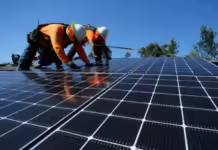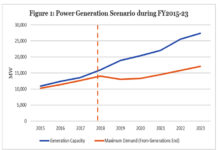Originally posted in The Business Standard on 15 January 2022
Direct subsidies and tax breaks keep fuel prices artificially low, lead to overconsumption and cause more pollution to air

Not a single country in the world prices fossil fuels “fairly”. The fossil fuel industry benefits from subsidies worldwide – $11m every minute. Subsidies on oil, gas and coal amounted to $5.9 trillion in 2020, which may go up to $6.4 trillion in 2025, estimates the International Monetary Fund.
The comprehensive IMF report last year showed subsidies, both for producers and consumers, put fuel prices at least 50% below their true costs – 99% for coal, 52% for diesel and 47% for natural gas. Five countries – China, the USA, Russia, India and Japan – accounted for two-thirds of the global fuel subsidies in 2020.
Direct subsidies and tax breaks keep fuel prices artificially low, lead to overconsumption and cause more pollution to air, making calls louder for reforming fossil fuel subsidies. The call has been reiterated in the Glasgow climate conference in November. Rich industrialised countries are big producers and users of fossil fuels. They are big contributors to global emissions, and at the same time they are declared crusaders against these “dirty fuels” repeating commitments at global forums.
Setting fossil fuel prices that reflect their true cost would cut global CO2 emissions by over a third and would lead the world a big step towards meeting the 1.5 degrees Celsius target, said an IMF analysis in July last year. Proper pricing of fossil fuels would encourage electricity generators to switch from coal to renewable energy and accelerate electric car production. Automobile giants are announcing their plans to revolutionise the car industry by replacing oil-powered engines with battery-run ones in a decade or two.
According to a report in the British daily The Guardian, over 600 global corporates including Siemens, Volvo, Unilever, Aviva, and Ikea are urging industrialised countries to end fossil fuel subsidies by 2025. A Brookings report in July last year suggested that the US should lead the global fuel subsidy reform by accelerating the pace of Group of 20 (G20) initiative to hike fossil fuel prices to meet Paris Agreement goals as well as developing a programme to help Least Developed Countries (LDCs) to remove fuel subsidies and promote their economic recovery.
Then why is it not happening? Why are countries, which boast of rapid progress in green energy, too slow on cutting subsidies on fossil fuel and setting their “true costs”?
It is easier said than done. Because there is no easy alternative to fossil fuels. Top fossil fuel consumer US took an aggressive drive to explore all possible ways to extract fossil fuels to ensure energy security after the 1973 OPEC embargo. For decades, America has pledged to end costly subsidies to the “dirty industry”. But in practice, no headway could yet be made to eliminate a raft of tax giveaways to the oil and gas industry that fuel harmful pollution to people, despite some initiative taken recently by the Biden administration to pass an advanced clean energy bill. It still gives $20 billion in direct subsidies to the fossil fuel industry a year, while tax subsidies amount to another $11.5 billion.
The G20 also stood almost firm on fuel subsidies though they repeated their commitment to phase out subsidies and rationalise prices. It includes the US, China, Germany, Russia, Saudi Arabia and India, all among the largest subsidisers still. The International Institute for Sustainable Development (IISD) says G20 nations spent $290 billion annually in production subsidies for coal, gas and oil even before the coronavirus pandemic. Another $320 billion was spent globally in 2019 in consumer subsidies. Because of their strong political lobbies, fossil fuel extracting and supplying companies managed to even raise their subsidies by 30% over the years in the OECD countries. Producers enjoyed the subsidies in the forms of tax breaks, production credits, guaranteed sales or accelerated depreciation for capital investment, which increased their profitability.

On the other hand, consumption subsidies declined on average, except for India. India provided its consumers $21.9 billion in fuel subsidies in 2019, says IEA data.
Amid soaring global gas and oil prices in 2021, India prevented domestic fuel price hikes and instead lowered duties to relieve consumers of price shocks. European countries too offered tax breaks and transfers to consumers.
Bangladesh perhaps was the only exception that passed the buck directly on consumers. It helped state oil monopoly BPC retain its profit, but left both industries and consumers to suffer direct and indirect shocks from upward adjustment in oil and LNG prices.
As depleting domestic gas supplies are gradually falling short of demand, import of LNG keeps growing. Global spot price of LNG is still too high, inflating Bangladesh’s import bills and there is a demand for higher subsidies. The demand for subsidies will stand at Tk70,000 crore – more than three times allocated in the budget for the current fiscal year. Of the amount, Tk25,000 crore is for fertilisers and the rest for electricity and LNG, according to a report of The Business Standard last week. The government looks to go for upward adjustments to prices of gas used in industries and power plants to fund LNG imports and offset some pressures of subsidies as the prime minister rejected a proposal to hike fertiliser price.
Power generation consumes 61% of gas, followed by industries with 16% and fertiliser factories take 5%. If gas prices go up for power plants and industries, it will ultimately be passed on to end users, the consumers of goods and services. If the price is not hiked, then the subsidy burden will be too high for the exchequer.
Economists say it is tough for the government to go for either of the two.
“If the government is to meet an additional subsidy burden of Tk60,000 crore or so, it will simply have to go for printing money, which will just fuel inflation. What the government should do is to make users pay,” says Dr Ahsan H Mansur, executive director of Policy Research Institute, a research firm, referring to projected revenue shortfall. If global gas prices drop, then the government might opt to not raise prices, but there are no indications when the global energy market will cool down, he said.
“So upward adjustment of gas price seems to remain a rational option for fiscal management, at least for now. It’s a difficult choice, but it’s true,” the former IMF economist said, stating that Bangladesh “no longer has the luxury” to subsidise gas since its own resource is running out fast.
However, Dr Fahmida Khatun, executive director of a research organisation Centre for Policy Dialogue feels there is a need to provide subsidies in some areas to protect low-income people from price shocks. “Fuel prices were hiked a few months back and consumers are still bearing the brunt. If adjustment in certain areas is inevitable, it should be done in phases, not at one go. Similarly, subsidies should also be targeted, not random,” she suggests.
Despite the fact that continued subsidies have some negative impact on financial sustainability, keeping the pandemic in mind, raising energy prices does not sound logical right at the moment since it is directly linked to inflation and recovery of businesses, says Dr Monzur Hossain, research director at the Bangladesh Institute of Development Studies, the state-owned think tank. “It will have an impact on the cost of living of people and cost of inputs for firms. Considering people’s welfare, subsidies should be continued for one or two more years,” he feels.
Criticisms against fossil fuel subsidies are plenty; they create market distortions by artificially lowering dirty fuel prices and causing overconsumption and pollution. Consumption subsidies have also proved ineffective in alleviating inequality as in the case of Indonesia where the richest decile of households consumed 40% of subsidised gasoline and the poorest decile less than 1%. In Bangladesh, privileged households use highly subsidised pipelined kitchen gas while rural households and people in most parts in the south-western region use expensive cylinder cooking gas.
Subsidies are not the best use of public finances. Yet they are in practice very widely all over. No country in the world – rich or poor – has ended fuel subsidies and set “true prices” of fossil fuels. There are pressures from the oil, gas and coal companies. There are fears of losing business competitiveness and backlashes from consumers. Bangladesh cannot go out of the box and say goodbye to subsidies altogether and set “true costs” of fuels. But it can at least ask some people to pay more.
To help targeted groups of people, direct benefit transfers can be a better way, as practised in some Indian states where cash support is sent directly to bank accounts of cylinder cooking gas users. The finance ministry is working on a strategy paper to directly give cash support to farmers who use diesel-run irrigation pumps. More such ways need to be devised to make sure that subsidies and transfers, which account for 34% of public expenses, benefit the targeted groups only and do not end up in the wrong pockets.






